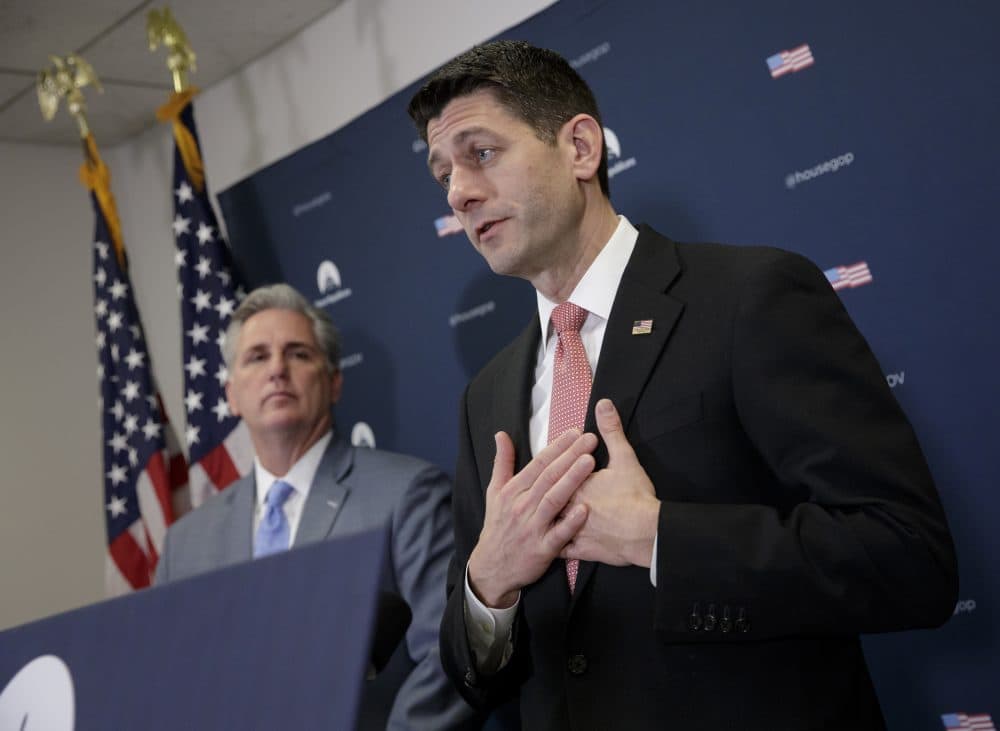Advertisement
Commentary
Memo To The GOP: We Already Have A Conservative Health Plan

Last week’s welcome demise of GOPcare (“a tax cut for the wealthy financed by dropping health coverage for the needy,” as columnist Nicholas Kristof accurately summarized it) does not end our national discussion over health care and the government’s role in it.
House Republicans are suing to pare back Obamacare subsidies, and President Trump implied he will revisit the insurance issue, because Obamacare is “exploding right now.”
Here’s what you need to know going forward. While Republicans marketed their dumber-than-dirt plan as a conservative replacement for the Affordable Care Act, they were wrong. We already have a conservative health plan. It’s called Obamacare, and, by the way, it’s not exploding.
[H]istory and the economics of health care show that House Speaker Paul Ryan, who led the charge for the Republican bill, drew less on conservative tradition than on the libertarian philosophy of his long time crush, novelist Ayn Rand.
I know that’s not the narrative politicians and the media have put out. But history and the economics of health care show that House Speaker Paul Ryan, who led the charge for the Republican bill, drew less on conservative tradition than on the libertarian philosophy of his long time crush, novelist Ayn Rand. Rand exalted laissez-faire economics and self-interest over altruism. (You can just see her smiling in her grave at the Republicans’ health bill.)
That's right, the politics that lead Ryan to conceive GOPcare are not conservative. Not convinced? Let's start with the world’s first mandatory national health insurance program, enacted not by Marxists but by a reactionary.
German Chancellor Otto von Bismarck feared socialism to the point of banning socialist meetings, newspapers and even trade unions. But he knew that socialism thrives when workers experience hardship, such as illness. So, in 1883, he enacted compulsory health insurance for certain classes of workers, financed by a payroll tax on employers and employees.
In Germany, the care was (and is today) provided by nonprofit insurance groups called sickness funds. Obamacare, with its mix of private and federal involvement, made American health care more like Germany’s. Both systems preserve a role for private insurance and market competition — distinctly conservative instincts.
Bismarck’s pragmatic conservatism would find purchase in intellectual circles. The late economist Friedrich Hayek appeals to the right with his ardent free-market principles. His 1944 book, "The Road to Serfdom," denounced centralized economic planning. So it will chagrin laissez-faire types that Hayek endorsed government intervention in health care: There is no reason, he wrote, “why the state should not help to organize a comprehensive system of social insurance in providing for those common hazards of life against which few can make adequate provision.”
More recently, the right-wing Heritage Foundation devised the insurance plan that Obamacare (and Romneycare in Massachusetts) codified. Once Barack Obama said he’d pick up Heritage’s baton, the foundation gave itself a charley horse trying to disavow it.
Maybe Heritage was embarrassed their plan was picked up by a liberal Democrat. But experts have long noted that Obamacare has to look the way it does. Here’s why: If you’re going to guarantee insurance for people with pre-existing conditions (and you must; otherwise, many forego needed care and, as Republicans realized, voters demand such coverage), then you have to require every citizen to have insurance. Otherwise, healthy and young people will choose to be uninsured — why pay premiums when you’re healthy? That leaves a smaller insured pool of sick people with expensive conditions, leading to soaring premiums. Hence, the ACA’s individual mandate.
But even with that mandate, the destitute will find it difficult or impossible to purchase care, so you have to subsidize them. In this country, advocates tout two ways to achieve this inevitable sequence of sick coverage, individual mandate and subsidies. One is socialized insurance, Bernie Sanders’s beloved single-payer system, in which the government pays all health bills.
The other, conservative route is something like Obamacare — private insurance coupled with federal regulation and subsidies. Contrary to progressive mythology, such partially private systems provide quality, affordable care from Germany to Switzerland to Singapore.
And contrary to Trump's statements, Obamacare isn’t “exploding.” While premiums jumped last year, the Congressional Budget Office and other analysts forecast that they’ll stabilize over time. That means the system’s immediate problems are eminently fixable; other nations’ approaches to encouraging free-market cost controls are among the ideas worth considering.
The only thing that has exploded is the GOP’s replacement plan, teaching us that neither wing of the party -- Trump’s know-nothing populism and Ryan’s do-nothing libertarianism -- offers a governing philosophy.
Ideas not worth considering include the Republican lawsuit’s demand for scrimping on subsidies. Partly because of these subsidies, Obamacare has brought the rate of uninsured Americans to an all-time low.
The only thing that has exploded is the GOP’s replacement plan, teaching us that neither wing of the party — Trump’s know-nothing populism and Ryan’s do-nothing libertarianism — offers a governing philosophy. Republicans dislike Obamacare because, as conservative columnist David Brooks notes, even market-based, universal insurance is going to be expensive.
Well, perhaps the right should think about health care the way William F. Buckley thought about national defense. The conservative icon once said that, by all means, let’s budget the military as economically as possible. Then, pay that bill, Buckley insisted, since defending the country is a necessary job of government. Defending us against preventable illness and bankruptcy from medical bills is as well.
